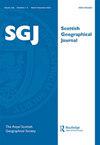无聊与气候变化的政治
IF 2
4区 社会学
Q2 GEOGRAPHY
引用次数: 1
摘要
摘要在这篇立场文章中,我推测,如果我们坚持认为无聊可能是受试者遭遇和理解气候变化的一部分,我们可能会对气候变化政治了解到什么。我认为,无聊产生了一种道德和政治上的矛盾,脱离了伴随着充满紧迫感的危机和紧急情况词汇而来的行动需求。无论无聊是拒绝面对气候变化,还是一种应对和居住在压倒性环境中的方式,对气候变化感到无聊都会让现有的对化石燃料生活和未来的依恋继续下去。气候变化事件被“暂停”了,因为它不再被人们所感知。我将这种“气候变化暂停”的关系与其他两种脱离气候变化事件的方式区分开来——“否认气候变化”和“推迟气候变化”。与否认或拖延不同,暂停对气候变化的要求被搁置,而不是结束。它的回归方式模糊了无聊和其他影响之间的界限。最后,我反思了气候变化的情感政治,并想知道无聊如何成为气候变化进步政治的一部分。本文章由计算机程序翻译,如有差异,请以英文原文为准。
Boredom and the politics of climate change
ABSTRACT In this position paper, I speculate on what we might learn about the politics of climate change if we stay with the possibility that boredom might be part of how subjects encounter and make sense of climate change. I argue that boredom enacts an ethically and politically ambivalent detachment from the demand to act that accompanies urgency-imbued vocabularies of crisis and emergency. Whether boredom is a refusal to face climate change, or a way of coping with and inhabiting the overwhelming, being bored with climate change allows existing attachments to fossil-fuelled lives and futures to continue. The event of climate change is ‘suspended’, in the sense that it is no longer affectively present. I distinguish this relation of ‘climate change suspension’ from two other ways of detaching from the event of climate change – ‘climate change denial’ and ‘climate change delay’. Unlike in denial or delay, in suspension the demand of climate change is held in abeyance, not ended. It returns in ways that blur the line between boredom and other affects. In conclusion, I reflect on the affective politics of climate change, and wonder about how boredom could become part of a progressive politics of climate change.
求助全文
通过发布文献求助,成功后即可免费获取论文全文。
去求助
来源期刊

Scottish Geographical Journal
GEOGRAPHY-
CiteScore
1.80
自引率
20.00%
发文量
19
期刊介绍:
The Scottish Geographical Journal is the learned publication of the Royal Scottish Geographical Society and is a continuation of the Scottish Geographical Magazine, first published in 1885. The Journal was relaunched in its present format in 1999. The Journal is international in outlook and publishes scholarly articles of original research from any branch of geography and on any part of the world, while at the same time maintaining a distinctive interest in and concern with issues relating to Scotland. “The Scottish Geographical Journal mixes physical and human geography in a way that no other international journal does. It deploys a long heritage of geography in Scotland to address the most pressing issues of today."
 求助内容:
求助内容: 应助结果提醒方式:
应助结果提醒方式:


